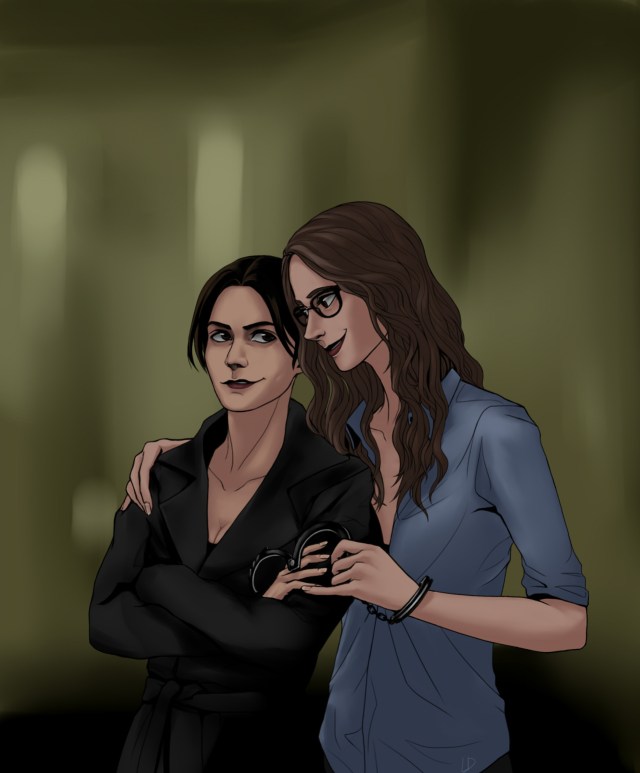
Fan Fiction Friday: Has Rainbow Rowell Legitimized Fan Fiction Once And For All?
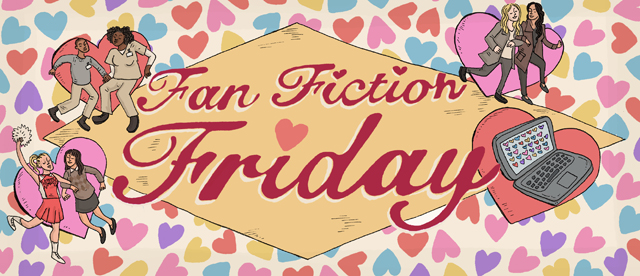
by rory midhani
Over the course of the summer, I had drinks and dinners and coffees with some of my favorite television writers. It’s always interesting to hear people I admire talk about things they’ve written, and juxtapose what they wanted me to feel with what I actually felt when I was watching their episodes of TV. It’s also fascinating to hear how many changes their personal visions go through from first script to final episode. Everyone’s giving feedback, you know. Showrunners, producers, actors, networks, studios. And once the script passes muster, the director shapes the story, and the actors, and the editor. And every character has a dozen writers writing for her at any given time. TV sausage is a very complicated thing!
Which is why I find myself drawn more and more deeply into fan fiction these days. I noticed it first during Glee, but now I think it’s true of most shows I watch: Fan communities often know queer TV characters better than the people who created them and get paid to write about them. And, more importantly, fan fiction writers aren’t bound by network constraints or ratings mandates or the demands of advertisers. Fan Fiction is pure, unfiltered story, and story is our most ancient need.
I am thrilled with the growing number of queer characters on TV, but many of them feel like paint-by-numbers kits to me. Fandom, however, never colors inside the lines.
This month, I’ve got a round-up of some Steven Universe fan fictions for you. I think it’s the best written show on TV right now, and one of the queerest. Longtime fan fiction writer Race Daniels chatted with me about all sorts of fandom related things, including harnessing fandom power and unleashing it in a way that really matters. I’ve rounded up some of the more interesting fan fiction conversations from mainstream media this month, and unsurprisingly many of them are about Rainbow Rowell’s new novel, Carry On. I’ve answered your burning TV questions, and I’ve got a book recommendation for you.
Fan Fiction Friday: Steven Universe
Everything I said above about how fandom often knows TV characters better than the folks who write them? That does NOT apply to Steven Universe. This show is a (forgive me) gem. Watching it is always a highlight of my week. The stories are so intricately and lovingly stitched together and voice-acted by almost all women of color. It has better character development than Mad Men, with none of the schadenfreude. Here are a handful of adorable Steven Universe stories.
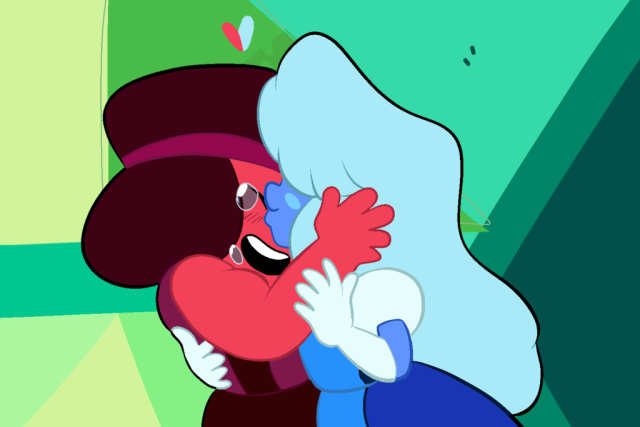
Love Overgrows a Rock by mautadite
Pairing: Ruby/Sapphire
Plot: “No one is that surprised, to tell it true. It’s always been Ruby and Sapphire, together.”
Length: 3,000 words
Honesty Is by TheColorBlue
Pairing: Ruby/Sapphire
Plot: “Garnet doesn’t worry about introducing Steven to her disparate parts. Well, she doesn’t visibly worry.”
Length: 3,100 words
United We Stand, Divided We Fall by Audrey_Lynne
Pairing: Ruby/Sapphire, Pearl/Rose Quartz (unrequited)
Plot: Sapphire sings. Ruby screams. It’s something of a joke, given their personalities. Until it’s Sapphire screaming, inconsolable, as her world is in shards around her. Literally. Featuring Steven’s healing powers, Pearl’s angst, and Amethyst’s stellar lack of refinement.
Length: 4,300 words
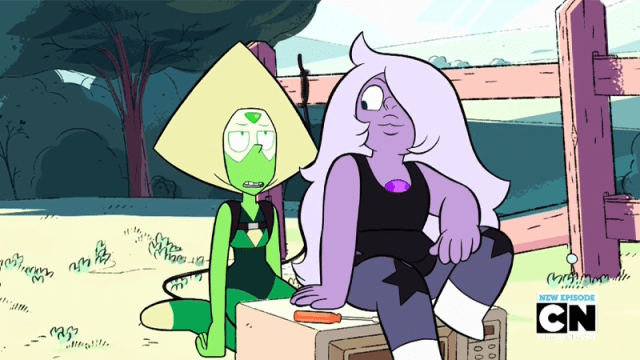
Unyielding Resonance by AeroCat
Pairing: Ruby/Sapphire
Plot: A longform fusion story!
Length: 18,000 words
I Want To Understand by Kris_Amethyst
Pairing: Peridot/Amethyst
Plot: After the events of “Too Far,” Peridot talks with Steven and Amethyst and struggles to understand the concept of love.
Length: 700 words
Serious Peridot by GollyGamma
Pairing: None, just Peridot!
Plot: Peridot is trapped in Steven’s bathroom. Now what?
Length: 3,5000 words
Listening to the news! Again?
Fandom in the news around the world this month.
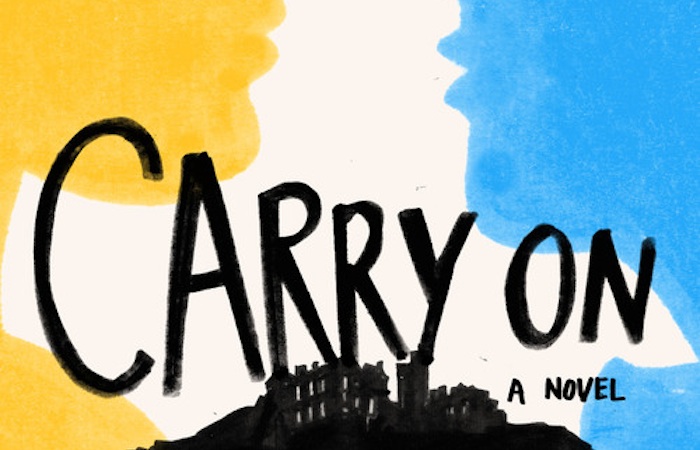
+ NPR’s review of Rainbow Rowell’s Carry On is written by one of us!
In preparing for this review I found myself searching for the opposite of “meta” — something that would mean below as well as above. Because in Carry On, Rainbow Rowell has written the book inside her other book, which was inspired by books outside her book, and it would be nice to have precise terminology to discuss such literary nesting dolls. In the absence of that terminology, I’ll say — not at all facetiously — that Carry On is hands-down the best Harry Potter fan fiction I’ve ever read, and I’ve read some genuinely excellent fan fiction (shout-out to GatewayGirl’s Blood Magic!).
+ And here’s Slate’s similarly glowing review: Rainbow Rowell’s New Book Is a Harry Potter Rip-Off That Proves How Great Fan Fiction Can Be
In Fangirl, at one point Cath gets in trouble in her creative writing class for turning in fan fiction. Her professor insists that it doesn’t count if she didn’t create the characters and the world in the first place. But Carry On makes a case for fan fiction’s literary legitimacy. It’s not easy to mimic, deconstruct, and remix the elements of a magical world in the way Rowell has here.
+ HuffPo examines “the sex-positive world of erotic fan fiction.”
This is an interesting article, but like basically every other article written by mainstream media about fan fiction, the author keeps that Professional Writer cred alive by reminding readers in various ways that she’s not one of these people who enjoys “poorly copy-edited” erotica about other people’s fictional characters. I don’t agree with a lot of the conclusions. Still, though, it’s well thought-out and well-reported. The writer had an open mind when she went into it, at least!
+ Tech Insider’s Culture blog rounded up what they believe are the eleven best Harry Potter AUs.
+ Thanks to the new Lisbeth Salander book, The Atlantic is grappling with fan fiction this month. You’ve read parts of this article a dozen times before. “Fan Fiction, it’s everywhere! JK Rowling likes it! Ann Rice hates it! People were writing fan fiction before the internet, if you can even believe it!” But what’s interesting here is that the author starts to pull on this thread of: Why are amateur fic writers mocked while David Lagercrantz (who wrote the latest Salander book) and all the millionaires who make rebooted superhero movies (which is basically just, like, Batman fan fiction) are so celebrated? It’s an incisive question.
+ Oh, just a 17-year-old girl landing a book deal ’cause her fan fiction is so good.
+ Competitive erotic fan fiction is a real thing.
+ The Duke University Chronicle published an interesting essay last month that I missed. The author wonders if mainstream derision of fan fiction is actually just another form of misogyny.
I am concerned about this social inclination to dismiss or trivialize fanfic works. The implication is that something written by women and read majorly by women is somehow less important and unworthy of respect. There was a loud and angry twitter campaign a while ago called #fakegeekgirls. The premise was that several women were attending comic conventions in costumes in order to “seem nerdy and pick up the interest of men.” Female cosplayers were specifically picked on and accused that they were dressing up to get attention. Yes, I saved up for weeks, tailored my own spandex outfit and took a nine hour flight to trap you in my romantic clutches, dear stranger.
Daily Prophet: Interview with Race Daniels
I met Race Daniels when I stumbled onto her Warehouse 13 fan fiction, “A Pirate’s Life For Me,” a couple of years ago. In the story, Helena is a pirate and Myka is a Special Agent and they fall madly in love on the sea. (Also, there are horses.) I love that story. It came to me at exactly the time I needed it. And so I tracked down Race and forced her to be my buddy, and now I follow her all around the internet and read what she writes every time she writes something. Not just fan fiction, though. Race is also all about fan communities strategically and effectively communicating with the people who make the TV shows they love, so their collective voice can have an impact on what they see on their screens. She was kind enough to pause her Person of Interest marathon yesterday and chat with me.
How did you get into fandom in the very beginning?
Oh man, it was back in the dark days of dialup and AOL chats, in 1999-2000, and it was fairly casual. I think I started with Xena and Star Trek Voyager and I mostly was just a passive reader. I had no real sense of the community back then. I did stumble across a few message boards, but I was always too chicken to really participate. And then in 2003 I found xenafiction.net and that’s pretty much where it the metaphorical shit got real. I started contacting — by email, because archives didn’t support reviews in those days — the authors of stories I liked. At least those who had posted an email address; not everyone did in those days, I just wrote how much I’d enjoyed their fic, etc. Mostly I got no responses or a “thanks for taking the time to say so” but one or two wrote back and we struck up a correspondence.
You’re a really excellent (and rightly admired) fan fiction writer, but your involvement with fandom is much broader than that. You spend a lot of time talking about how fandom can influence what actually happens on TV. Can you talk a little bit about that part of your fandom experience?
I love you for saying so but the truth is I don’t consider myself an excellent writer. I’m constantly finding other fic writers that drive me to try and improve my writing. As for the relationship between fandom and TV, though, you’re right in that I am super passionate about this. At the same time, though, I’m often very frustrated by the lack of understanding of how media as an industry works. Which I want to stress is not meant as a dig at fandom. The sausage of TV making is not at all a transparent process. Decision making that results in the stories we see on our screens often happens at levels fans have no access too. A storyline we hate may have been mandated by an executive looking at some obscure advertising data crunched by an analyst the average fan has no idea even exists.
When the Warehouse fandom worked toward getting a fifth season, one of the things the people behind the campaign tried to do was provide as much information as possible about the financial motivations of networks because story doesn’t mean beans. TV isn’t about artistic integrity. It’s not about social good. It’s about money. To an unfortunate extent it will probably always be about money. And overwhelmingly (although I do think it’s changing for the better), the metrics and data too many networks base their decisions about how to make that money on are wrong.
A major part of RenewWarehouse13’s campaign was a survey designed to show Syfy they had a significant non-traditional viewing audience not captured by Nielsen. Younger viewers no longer want to be tied to cable schedules and 18 minutes of advertising per 60 minute time slot, but that reality isn’t being reflected yet in programming decisions. Like any system of power in the US, people in decision making positions in media companies are generally heterosexual, cisgender, older, white males, a fact which has exactly the effect on what media looks like that think it does. It’s changing: I could not be happier about Shondaland, Legend of Korra, and tween-targeted shows like The 100 — but it’s changing because people like Shonda Rhimes and shows like Empire and the creators of Legend of Korra and Adventure Time and Steven Universe are showing networks that diversity can be profitable. It’s horrible to have to talk about it in those terms, but that’s the media environment we’re dealing with.
You do a lot of work with subtext fandoms. Is that more of a draw for you than maintext fandoms?
Some of it is probably a holdover of just “growing up” in a media era where there was almost no maintext. Especially in genre shows. If you were a fan of ladies wielding guns or exploring outer space, you dealt in subtext. But for me as a writer I also really love having more “space” to play with the characters. I don’t need to fix canon femslash nearly as much, I’m happy to just watch the story unfold. (Well, usually.)
Let’s talk about Person of Interest. With the exception of Glee, which was basically forced into going there with Santana and Brittany, and did so grudgingly every step of the way for six seasons, there’s never been a show where two female characters were not conceived as queer but had such good chemistry that the writers really decided to go all in on a romantic relationship. (RIP WH13 dreams.) Do you think this is the future?
Bless this show. Bless the actresses and the writers and the production team who tell such intelligent stories and treat their audience with so much respect. I’ve never so thoroughly enjoyed the entire experience of being a fan of a TV show as with Person of Interest (even though Bering and Wells will always be the OTP). I would like to say relationships like Root and Shaw are the future but the media landscape is fickle enough I hesitate to make that claim. And to be brutally honest, I don’t just want more Root and Shaw situations (although I can think of one major one right now I’d like to see – anyone who’s been on my Tumblr knows what ship that is). I’d love to see more production teams have the guts and networks allow what the POI team did, but I want the future to have queer lady couples planned from the beginning. I want actresses cast before the pilot agreeing to play and promote and publicize a queer lady romance that is central to the plot and not just a check in the “diversity” box. I want the “will they/won’t they?” twist to be two ladies and the TV Guide cover to be flirty and adorable and sell out that issue. I think Person of Interest was potentially an incredibly important step in mainstreaming queer lady relationships, but I really want it to be just that. A step.
I want to talk a little bit about Swan Queen fandom. Really passionate, talented fandom, with staying power. But it seems unlikely anything on-screen is ever going to come out of that pairing. (More than one person at ABC has told me it’s not.) Do you find merit in continuing to participate in those fandoms where it’s likely always going to be subtext? Does there have to be the draw of it one day being on-screen for you to get excited about it, I guess, is what I am saying.
Does my shipping depend on potential for canon? LOL. Nah. My formative fandom years were Xena and Star Trek, my first LiveJournal fandoms were CSI and Criminal Minds. There was Legend of the Seeker and Otalia and then of course Bering and Wells and now SQ. It’s never been about canon for me. That doesn’t mean I don’t adore ships like Doccubus or Korrasami or Root and Shaw or Clexa or Calzona or The Fosters. We need all the canon ships we can get our hands on, and every ship brings something different and meaningful to the table in regard to visibility, but I’ve always been more interested in the transformative aspects of fandom.
Fandom has been such an amazing opportunity to be able to listen to so many extraordinarily intelligent people who I wouldn’t get to learn from anywhere else, people that have made me examine myself, my own privilege and the discourses in the media I consume in very necessary ways. I don’t want to say “fandom made me smarter” because I probably already sound pretentious enough but I do think it has made me less dumb, and I like that.
My own personal experience is that people who only care about canon tend to start sounding like gatekeepers after a while — those fanboys who refuse to consider you a “true fan” unless you can name every single ship in the registry that ever appeared on screen in Star Trek. That makes me deeply uncomfortable. No one should tell someone else that what they can or can’t find meaningful in a story. When “canon” becomes the end-all-be-all yardstick, I think it’s too easy to lose the subversive aspects of fandom that make it such an important place for learning. If canon is the only thing that matters why have discussions about how women are treated, or how characters of color are written, or how this narrative perpetuates rape culture, or how that story is strawman feminism? Canon is important but frankly I think it’s just the starting place for fandom’s greatest strengths: creation of new content and critique of the source material.
Can you talk a little bit about how fandom has changed your life just in terms of making real world friends?
Oh wow, fandom and real life and friendships. Can I just draw little heartseyes emojis all over the page? I literally cannot imagine the last few years without the Lunatics and the Bering and Wells fandom and the members of the SQ fandom I’ve become close with and the almost indescribable joy of finding a group of people who welcome all your insanity and make you go “Yes, these are my people.” I’m old enough that it sometimes still blows my mind that if I wanted to, I could visit people all across the US, in Canada, Latin America, Europe, Asia, and Australia, all just because at some point or another we wanted the same two fictional idiots to kiss.
Fandom has also been a place where I’ve developed a very tangible skill set. I’ve learned a staggering amount about social media networks, audience engagement, marketing, writing, and content creation and I am not at joking when I say I would pit fandom against a lot of professional marketing companies and bet on fandom every time. A lot of the vocabulary and theory I learned in graduate school also only became “real” by participating in fandom. It made me look much more critically at media. Fandom has been such an amazing opportunity to be able to listen to so many extraordinarily intelligent people who I wouldn’t get to learn from anywhere else, people that have made me examine myself, my own privilege and the discourses in the media I consume in very necessary ways. I don’t want to say “fandom made me smarter” because I probably already sound pretentious enough but I do think it has made me less dumb, and I like that.
What’s the most important thing about fandom?
If I had to pick the most important thing about fandom I would say fandom’s ability to educate fans and raise the level of critical discourse about mass media. The discussions that go on — at least in femslash circles, obviously I can’t really speak to fandom outside femslash — about internalized misogyny and racism and rape culture and transphobia; these are such important discussions and because of how fan networks are constructed and how far information can spread. We have the ability to move this discourse beyond our immediate spaces.
The smarter and more self-aware fandom is, and the more we take that discourse beyond our Tumblrs to influence the general audience, the more impact we can have on what mass audiences want — and, in turn, what network execs think audiences want, and therefore provide. Again, a lot of it comes back to money, so the more educated and critical fans are, the more likely we will start seeing media that reflects our views rather than catering to the same old demographics. I’m so excited to see the impact of shows like Legend of Korra and Steven Universe because of what it means for the expectations of the next generations of fans.
When in doubt, go to the library.
A personalized book recommendation for you!
I’m ashamed to admit it, but I only just read Bell Hooks‘ Reel to Real: Race, Sex, and Class at the Movies. The book includes interviews with filmmakers and over a dozen essays from Bell Hooks that examine the way different films engage with ideas about race, sex, class, gender, etc. and how we internalize the coded messages we’re receiving, whether we realize it or not. In some ways the book is quite dated. It was published in 1996 and some of the essays were written even before that, but in terms of dissecting the ways film and culture are shaping each other in a symbiotic relationship, the ideas Hooks presents are timeless.
We keep coming back to the question of representation because identity is always about representation. People forget that when they wanted white women to get into the workforce because of the world war, what did they start doing? They started having a lot of commercials, a lot of movies, a lot of things that were redoing the female image, saying, “Hey, you can work for the war, but you can still be feminine.” So what we see is that the mass media, film, TV, all of these things, are powerful vehicles for maintaining the kinds of systems of domination we live under, imperialism, racism, sexism etc. Often there’s a denial of this and art is presented as politically neutral, as though it is not shaped by a reality of domination.
It’s free on Google Books. My library had two copies.
Owl Post
A handful of answer to a handful of TV questions.
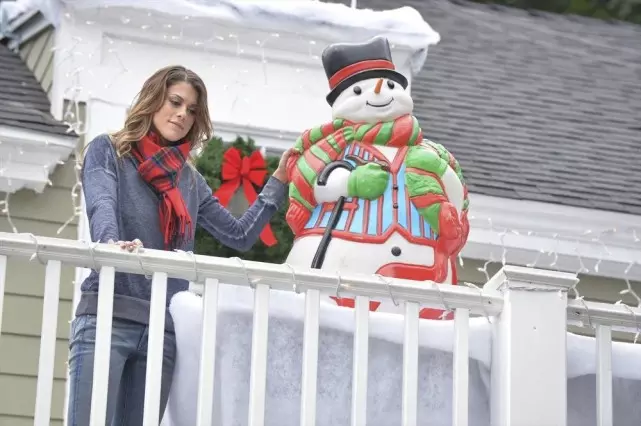
Caroline asks: Why do bad ships happen to good shows?
Bad ships happen to good shows because of exactly what Race said in her interview up there: Networks exist to make money, and they produce shows they hope soap-makers will pay a lot of money to advertise during, and the way to get soap-makers to pay a lot of money is to pull in a lot of viewers, and the way to pull in a lot of viewers is to appeal to the majority, and the majority of people like shitty shit. Also because writers get lazy and lean too much on tired tropes; or because writers are straight white guys who don’t check their monolithic view of the world; or because mainstream culture, in general, is a pretty gross place and most stories are written for people who don’t want to dismantle that grossness.
Lucy asks: What are your favorite tropes?
All the ones from Pride and Prejudice, and when two people who love/hate each other get trapped somewhere cold and are forced to share body heat.
Jerzey asks: 1. What is your favorite non-canon pairing? 2. What is the most influential fandom? 3. What ship were you most surprised that you liked?
1. Sadly, it is Bering and Wells. (Sadly, because there’s no reason they were not full-scissoring canon.) 2. Sadly, it was Glee. (Sadly, because we gave Ryan Murphy success and now look at him go.) 3. Root and Shaw! I thought Person of Interest was just another dumb procedural — CBS has done a terrible job marketing that show — and that those two were just going to be another damn Rizzoli and Isles. But they are SO MUCH MORE than that. Their characters are more fully realized, their affection is much deeper. They are good. They are a good ship. I cannot wait until next season.
Writing Writer asks: Will characters like Annalise Keating and Clarke Griffin help calm the stigma against bisexual leads on TV?
It’s all going to depend on how well the shows do, ratings-wise. HTGAWM‘s ratings are hardcore tanking this season. (Have you noticed the story is basically season six of The L Word? I know, I didn’t want to say it out loud either.) So there’s going to be a mandate from ABC come midseason, you can bet your bottom dollar on that, and so who knows if Famke will be the first thing to go? As for The 100, the buzz is better than ever, and The CW is expecting it to do very good things in 2016, so my fingers are crossed for that. Networks are all about the eyeballs. It doesn’t matter to them if people are bitching about their show being some kind of bisexual abomination hour; it matters to them if people are bitching about it while using their eyeballs and DVRs to watch it.
McCPLL asks: Why do you think ships like Ezria are supported by networks while healthy love like Paige and Emily are constantly scrutinised?
Unfortunately, this is the same answer as number one: Dollar bills, pumpkin.
Dr. Daphna asks: What’s the beest fanfic title ever?
JessIsBest asks: Do you think Mulan returning to OUAT is going to hurt SwanQueen’s chances at being canon?
Nah. I actually have a sneaking suspicion Mulan isn’t even going to be involved in the Big Gay Relationship those guys keep promising. I’d bet my entire sack of Halloween candy that it’s going to be two randoms from Camelot that we’ve never heard of and will never see after their three episode love story arc. If I’m wrong, though, you’ll have a whole bunch of mini Reese’s and a Gal Pal Disney Princess!
And, look, I’m not trying to dissuade you from shipping who you ship, but if I had a nickel for every person at ABC who flat out told me Swan Queen isn’t going to happen, you’d be able to buy Willy Wonka’s factory and skip trick-or-treating all together. Your heart wants what it wants and I honor that and I’m sorry. At least SQ fandom is full of deliriously romantic and superbly written fic!
JuBee asks: Are you excited about PLL season 6B?
To be honest with you JuBee, I am not. I have a feeling some things are coming that are going to displease me greatly and I just want to write about the show I love, like the the one in seasons one through four, you know? You know. I love #BooRadleyVanCullen more than anything and I have loved so much of what this show has given us, but that finale really broke my heart.

